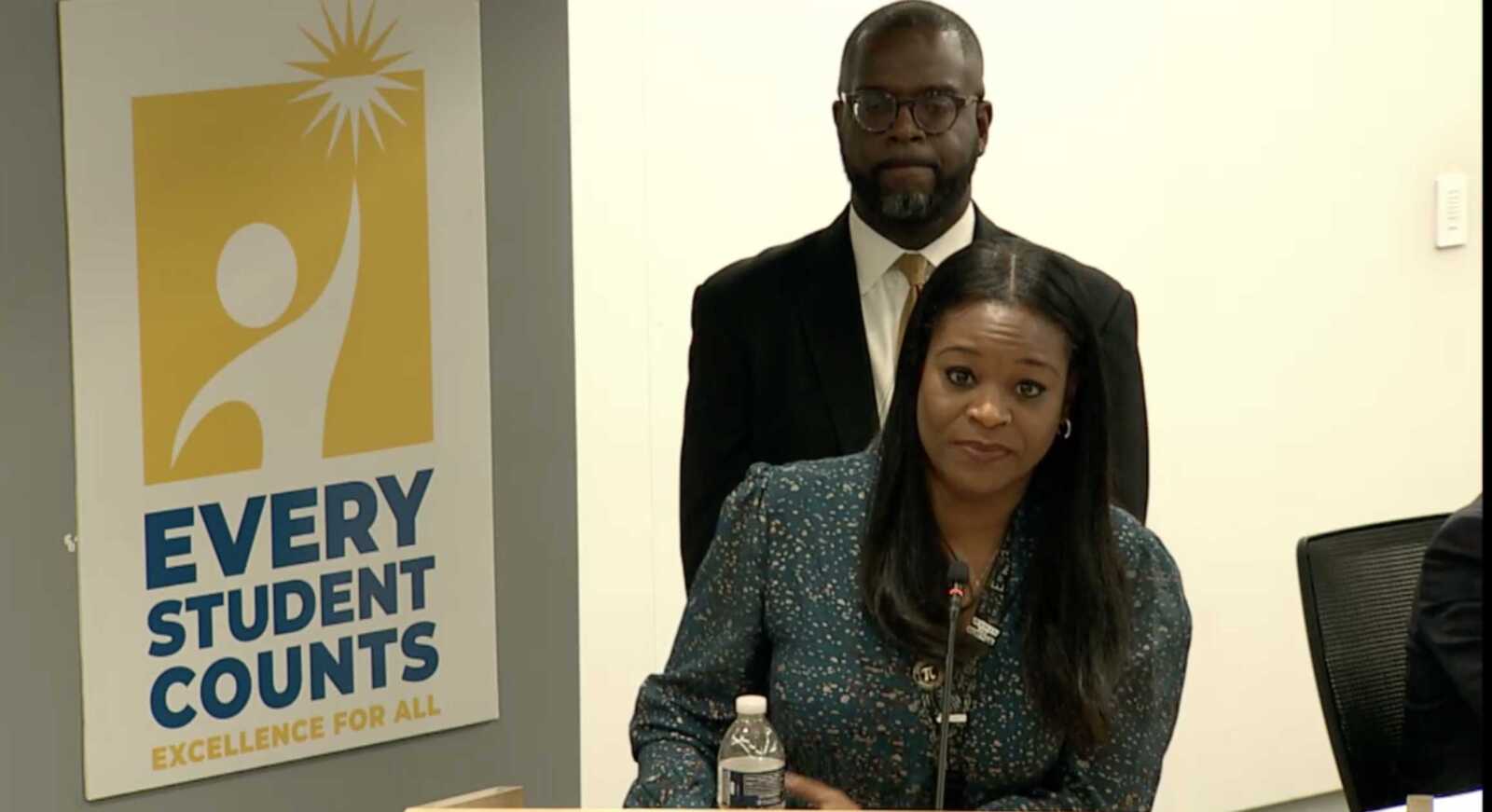
Arlington Public Schools says it is closing a math achievement gap worsened by Covid.
But a School Board watchdog group says the school system’s new progress report is missing pre-Covid data and paints a misleading picture of how far APS still has to go.
Overall, every student subgroup Arlington tracks — based on race or ethnicity or economic status, for instance — saw gains since in-person school resumed, according to the APS math office, which presented new data to the Arlington School Board during its Oct. 12 meeting. The new results were part of a discussion of the work of the office and math teachers to help students recover Covid-era drops in performance on state math tests called the Standards of Learning, or SOL.
The office highlighted the growth among students who scored the lowest on math SOL tests and received support from Arlington’s 10 new math interventionists. They are stationed at three middle schools in South Arlington and all but one of Arlington’s 10 Title 1 elementary schools, which have the highest concentration of low-income students. The office noted students with access to interventionists progressed more than their peers without that support.
The distinction was played as part of a pitch for more math interventionists in the upcoming budget. Elementary Math Supervisor Shannan Ellis said teachers report students with access to interventionists demonstrate more confidence in math, think more flexibly and persist when faced with challenges.
“This is for the children in Arlington County to get what they need,” Ellis said. “These are people who are working with our students [who] have the greatest need… [where] it is either highly improbable or impossible for teachers to grow them in one or more years.”
While the presentation focused on three-year trends, a “deeper dive” into more historical math data is forthcoming, Chief Academic Officer Gerald Mann told the School Board.
For Arlington Parents for Education, which formed during the pandemic to advocate for school reopenings and a focus on Covid-era learning loss, not including pre-Covid data downplays the width and persistence of achievement gaps in Arlington.
“APS should not obscure the large remaining challenges to the School Board or the public — it still has a long way to go in terms of recovering from the learning losses caused by prolonged school closures, which have dramatically increased the gap in performance between at-risk students and other students,” it says in a recent letter. “And the rate of recovery on both dimensions is too slow. ”
Virginia Dept. of Education data show the achievement gap in Arlington among Black and Hispanic and white students, for instance, was wider than the state-level gap pre-Covid. The pandemic exacerbated these gaps.
There are similar trends in the achievement gaps for students who are economically disadvantaged or learning English.
Among its issues with the presentation, APE disputed how the presentation celebrated that, for economically disadvantaged students, “APS is closing the gap faster than the state.”
“This overlooks the point above that we are ‘closing the gap’ faster primarily because there is a bigger gap to close (in comparison to the state),” it said, noting APS ranks 65th out of 130 districts in Virginia for math SOL rates for economically disadvantaged students, which is down 10 places from its ranking in 2016-17.
“In other words, not only is APS failing to improve the performance of at-risk students at the same pace as the state, in comparison to the year 2016-17, our performance relative to other districts has declined,” the group said.
School Board member Bethany Zecher-Sutton had her own qualms with the presentation, calling for a fuller account of how APS is addressing these gaps.
“If we as a system have a commitment to improving outcomes for all of these students, and we don’t we we don’t have the slides showing us what we are doing in these areas to address the outcomes for those students, then I am not sure we are going to get there,” she said.
She said the presentation leaves out the work of math teachers.
“I am left a little bit with this nagging, unhappy sense that if I was a math teacher, I might feel a little irrelevant in this presentation,” she said. “So I think the math teachers are doing all the work and you all are supporting them, but I’m not seeing what are the math teachers themselves doing.”
In response, Ellis said APS has “amazing teachers” but even they say they appreciate the interventionists helping them with what “seems like an impossible task.”
Some School Board members seemed amenable to splurging on more interventionists.
“I’m trying to wrap my head around how we can afford this in the context of everything else that we’re going to have in our budget this year,” said Board Chair Cristina Diaz-Torres, a former math teacher. “And this definitely, for me personally as one board member, rises to a very high priority, both given the evidence… of the effectiveness of these interventions and also the need.”
Board Vice-Chair David Priddy said APS can justify the expense because, paraphrasing Ellis, math interventionists make APS more attractive to prospective teachers.
While the School Board mulls whether to pay for more interventionists, APE says members should be directing APS to take “more aggressive actions.” The group suggests intensified tutoring, more instructional time for underperforming students and a system-wide effort to ensure 90% of students can perform math at grade level within two years.
“We say this not to criticize the math team specifically nor its efforts — we believe the math team is earnestly looking for ways to advance APS’ students,” the letter said. “But absent a complete picture, the School Board and the community may conclude that the current remediation steps and level of investment are sufficient.”
APE told ARLnow it received a response from Superintendent Francisco Durán, who said APS is pleased with the progress so far but must focus on “continued and accelerated supports for our students.”

